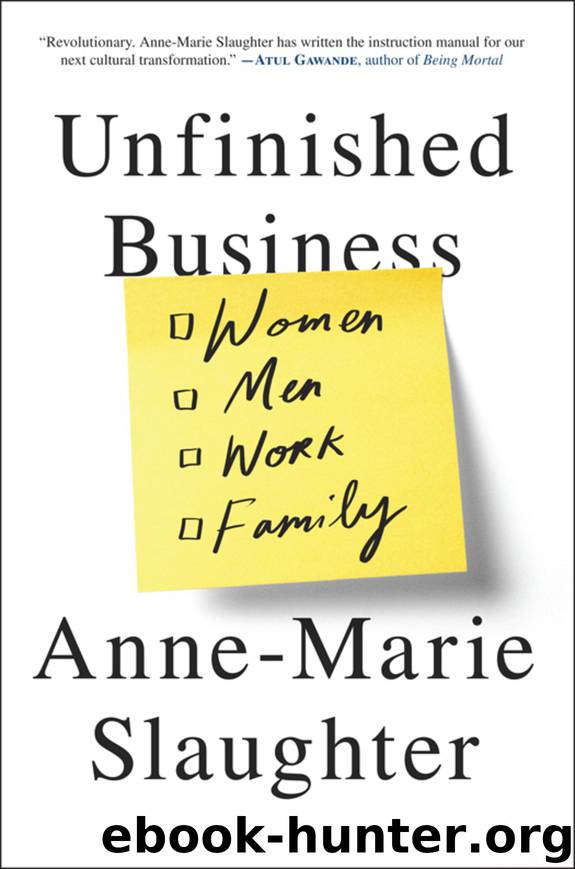Unfinished Business by Anne-Marie Slaughter

Author:Anne-Marie Slaughter
Format: epub
Publisher: Random House of Canada
Published: 2015-09-28T16:00:00+00:00
WE DON’T WANT TO GIVE IT UP
I VIVIDLY REMEMBER THE FIRST time one of our sons woke up in the night and called for Daddy instead of Mommy. My first reaction, to put it politely, was deep dismay. I’m his mother. Kids are supposed to call for their mother. If he’s not calling for me, then I must not be a good mom.
All this is racing through my head while my husband is sleeping soundly next to me; I, after all, was the one who woke up when our son called out. (Andy swears that he wakes up when I’m not there; I’ll never know! But our sons have never complained of crying out and no one coming when I’m away.)
On that particular occasion, I got up and comforted my son, telling him Mommy was here and that Daddy was sleeping downstairs; all was right with the world. Over the years, on the many other occasions when our sons turned first to Andy rather than to me—for homework help or advice on subjects ranging from music to girls—I have had some tough conversations with myself. Even if, as my mother would say, I have always wanted to have my cake and eat it too, I simply cannot have all the rewards and satisfactions of my career and expect to be the person my sons call for first.
I have also reflected on my emotion that night. Was it guilt? That ideal of the good mother as the person who is always there when her kids need her? In the United States, at least, we’ve beaten that subject to death in recent years, asking ourselves repeatedly why the standards of mothering have become so exacting and all-consuming. I have often wondered what happened to the mantra of “benign neglect,” which my mother used to quote as the best guide to child rearing. As one of my friends put it, nowadays “benign neglect would result in someone calling social services.”
In her 2014 bestseller All Joy and No Fun: The Paradox of Modern Parenthood, Jennifer Senior points to the confluence of several factors—Americans having fewer children, women having more control over their reproductive lives thanks to widely available contraception, and parents having children later than they did in my mother’s day—as reasons why benign neglect went out of style. From 1970 to 2006, the proportion of women having their first child after the age of thirty-five increased nearly eightfold. “Because so many of us are now avid volunteers for a project in which we were all once dutiful conscripts,” Senior writes, “we have heightened expectations of what children will do for us, regarding them as sources of existential fulfillment rather than as ordinary parts of our lives.”
If I am honest with myself, the hardest emotion to work through when I heard our son call for Andy rather than for me was not guilt but envy. Even with all the rewards of my career, I would still like for them to call for me first. As the psychiatrist Andras Angyal writes, “We ourselves want to be needed.
Download
This site does not store any files on its server. We only index and link to content provided by other sites. Please contact the content providers to delete copyright contents if any and email us, we'll remove relevant links or contents immediately.
Tools of Titans by Timothy Ferriss(8393)
Change Your Questions, Change Your Life by Marilee Adams(7780)
Deep Work by Cal Newport(7083)
Playing to Win_ How Strategy Really Works by A.G. Lafley & Roger L. Martin(6302)
Man-made Catastrophes and Risk Information Concealment by Dmitry Chernov & Didier Sornette(6019)
Big Magic: Creative Living Beyond Fear by Elizabeth Gilbert(5771)
Digital Minimalism by Cal Newport;(5764)
Ego Is the Enemy by Ryan Holiday(5447)
The Slight Edge by Jeff Olson(5417)
The Motivation Myth by Jeff Haden(5212)
The Laws of Human Nature by Robert Greene(5208)
Stone's Rules by Roger Stone(5087)
Tuesdays with Morrie by Mitch Albom(4784)
Eat That Frog! by Brian Tracy(4537)
Rising Strong by Brene Brown(4459)
Skin in the Game by Nassim Nicholas Taleb(4248)
The Money Culture by Michael Lewis(4207)
Bullshit Jobs by David Graeber(4190)
Skin in the Game: Hidden Asymmetries in Daily Life by Nassim Nicholas Taleb(4004)
